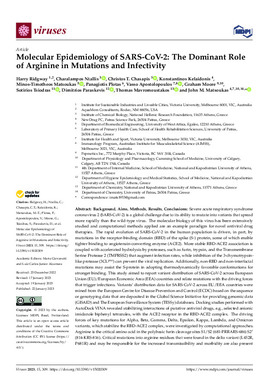Παρακαλώ χρησιμοποιήστε αυτό το αναγνωριστικό για να παραπέμψετε ή να δημιουργήσετε σύνδεσμο προς αυτό το τεκμήριο:
https://hdl.handle.net/10442/19084| Εξειδίκευση τύπου : | Άρθρο σε επιστημονικό περιοδικό |
| Τίτλος: | Molecular Epidemiology of SARS-CoV-2: The Dominant Role of Arginine in Mutations and Infectivity |
| Δημιουργός/Συγγραφέας: | Ridgway, Harry Ntallis, Charalampos [EL] Χασάπης, Χρήστος[EN] Chasapis, Christos  Kelaidonis, Konstantinos Matsoukas, Minos-Timotheos Plotas, Panagiotis Apostolopoulos, Vasso Moore, Graham Tsiodras, Sotirios Paraskevis, Dimitrios Mavromoustakos, Thomas Matsoukas, John M |
| Ημερομηνία: | 2023-01-22 |
| Γλώσσα: | Αγγλικά |
| ISSN: | 1999-4915 |
| DOI: | 10.3390/v15020309 |
| Άλλο: | 36851526 |
| Περίληψη: | Background, Aims, Methods, Results, Conclusions: Severe acute respiratory syndrome coronavirus 2 (SARS-CoV-2) is a global challenge due to its ability to mutate into variants that spread more rapidly than the wild-type virus. The molecular biology of this virus has been extensively studied and computational methods applied are an example paradigm for novel antiviral drug therapies. The rapid evolution of SARS-CoV-2 in the human population is driven, in part, by mutations in the receptor-binding domain (RBD) of the spike (S-) protein, some of which enable tighter binding to angiotensin-converting enzyme (ACE2). More stable RBD-ACE2 association is coupled with accelerated hydrolysis by proteases, such as furin, trypsin, and the Transmembrane Serine Protease 2 (TMPRSS2) that augment infection rates, while inhibition of the 3-chymotrypsin-like protease (3CLpro) can prevent the viral replication. Additionally, non-RBD and non-interfacial mutations may assist the S-protein in adopting thermodynamically favorable conformations for stronger binding. This study aimed to report variant distribution of SARS-CoV-2 across European Union (EU)/European Economic Area (EEA) countries and relate mutations with the driving forces that trigger infections. Variants' distribution data for SARS-CoV-2 across EU/EEA countries were mined from the European Centre for Disease Prevention and Control (ECDC) based on the sequence or genotyping data that are deposited in the Global Science Initiative for providing genomic data (GISAID) and The European Surveillance System (TESSy) databases. Docking studies performed with AutoDock VINA revealed stabilizing interactions of putative antiviral drugs, e.g., selected anionic imidazole biphenyl tetrazoles, with the ACE2 receptor in the RBD-ACE2 complex. The driving forces of key mutations for Alpha, Beta, Gamma, Delta, Epsilon, Kappa, Lambda, and Omicron variants, which stabilize the RBD-ACE2 complex, were investigated by computational approaches. Arginine is the critical amino acid in the polybasic furin cleavage sites S1/S2 (681-PRRARS-686) S2' (814-KRS-816). Critical mutations into arginine residues that were found in the delta variant (L452R, P681R) and may be responsible for the increased transmissibility and morbidity are also present in two widely spreading omicron variants, named BA.4.6 and BQ.1, where mutation R346T in the S-protein potentially contributes to neutralization escape. Arginine binders, such as Angiotensin Receptor Blockers (ARBs), could be a class of novel drugs for treating COVID-19. |
| Τίτλος πηγής δημοσίευσης: | Viruses |
| Τόμος/Κεφάλαιο: | 15 |
| Τεύχος: | 2 |
| Θεματική Κατηγορία: | [EL] Ανοσολογία[EN] Immunology [EL] Επιδημίες. Επιδημιολογία[EN] Epidemics. Epidemiology  [EL] Δομική Βιολογία[EN] Structural Biology  [EL] Ιολογία[EN] Virology  [EL] Βιοπληροφορική[EN] Bioinformatics  |
| Λέξεις-Κλειδιά: | SARS-CoV-2 COVID-19 epidemiology mutations (SSCP) ACE2 ARBs RAS RBD arginine proteases infectivity |
| Κάτοχος πνευματικών δικαιωμάτων: | © 2023 by the authors. Licensee MDPI, Basel, Switzerland. |
| Όροι και προϋποθέσεις δικαιωμάτων: | This article is an open access article distributed under the terms and conditions of the Creative Commons Attribution (CC BY) license (https:// creativecommons.org/licenses/by/ 4.0/). |
| Ηλεκτρονική διεύθυνση στον εκδότη (link): | https://doi.org/10.3390/v15020309 |
| Σημειώσεις: | This article belongs to the Special Issue Molecular Epidemiology of SARS-CoV-2 |
| Εμφανίζεται στις συλλογές: | Ινστιτούτο Χημικής Βιολογίας - Επιστημονικό έργο |
Αρχεία σε αυτό το τεκμήριο:
| Αρχείο | Περιγραφή | Σελίδες | Μέγεθος | Μορφότυπος | Έκδοση | Άδεια | |
|---|---|---|---|---|---|---|---|
| Ridgway et al_2023_viruses-15-00309-v2.pdf | Open access article | 39.56 MB | Adobe PDF | Δημοσιευμένη/του Εκδότη |  |  Δείτε/ανοίξτε |




